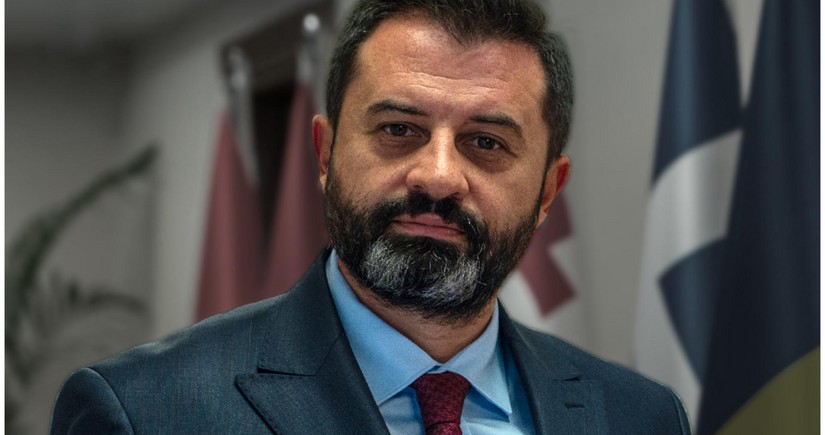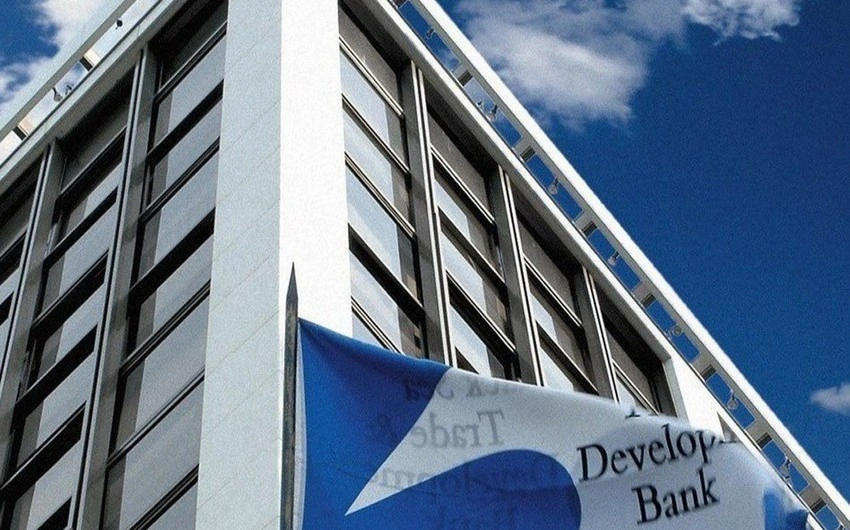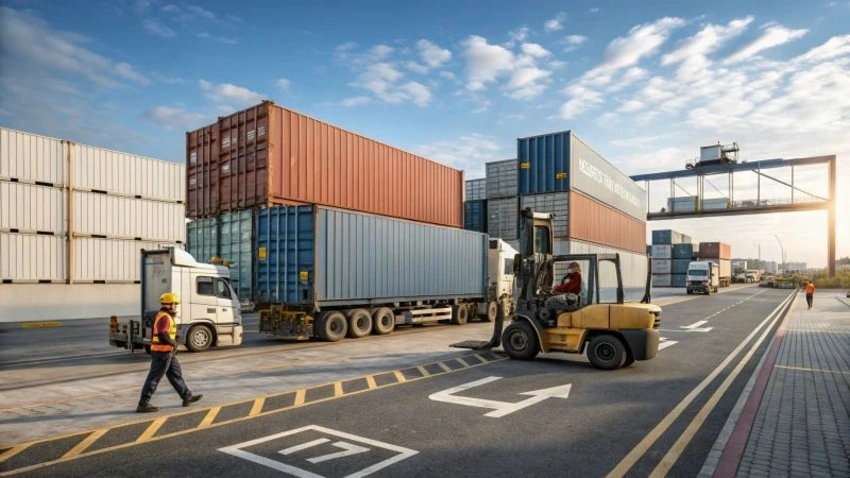Serhat Koksal: BSTDB ready to finance cross-border projects to strengthen Azerbaijan's role as strategic hub of Eurasia - INTERVIEW
- 14 July, 2025
- 14:26

Against the backdrop of geoeconomic shifts and the growing need for regional resilience, the Black Sea Trade and Development Bank (BSTDB) is completing the transition from a stabilization strategy to a phase of renewed growth.
The focus of the new phase of the business plan for 2025-2026 is on restoring operational activity, sustainable use of capital, and strengthening financing for projects that contribute to economic development and regional integration.
Special attention is being paid to countries such as Azerbaijan, which is considered one of the key partners in the areas of infrastructure, renewable energy, and public-private partnerships.
The 28th annual meeting of the BSTDB Board of Governors in 2026 will be held in Azerbaijan, which underlines the growing role of the country in the regional agenda.
BSTDB President Serhat Koksal spoke about the priorities of the updated strategy, Azerbaijan's role, and prospects for cross-border cooperation in an interview with Report.
Report presents the interview:
- Last year, the Black Sea Trade and Development Bank (BSTDB) approved the second phase of its Strategic and Business Plan for 2025–2026. What are the key priorities outlined in this document? What changes have been introduced compared to the previous phase, and how do these priorities reflect the current geoeconomic challenges and transformations in the Black Sea region?
- Phase 1 of the Medium-Term Strategy and Business Plan 2023-2026, prepared after the immediate start of the conflict between the Bank’s two shareholders, focused on safeguarding the institution, deleveraging in order to preserve capital and enhance liquidity, steering through a complex and constantly shifting financial environment and geopolitically induced restrictions on activity. These prudent but difficult choices necessitated a temporary slowdown in operational activity as we prioritized preservation and safety in order to achieve the necessary degree of clarity that would permit the Bank to return to pursuing its institutional mandate to promote regional cooperation and support economic development. The turning point came in the middle of 2024, with the stabilization of its portfolio being accompanied by the successful conclusion of its second capital increase and the repayment of a key benchmark bond. Since then, and fortified by the strong commitment of its shareholders and the solid state of its key indicators of financial health, the Bank began a measured resumption of operating activity. Phase 2 of the strategy covering 2025-2026, builds on these achievements and envisions continuing the return to the Bank’s traditional business model of steady managed growth, wherein it leverages its capital prudently in order to finance directly, and attract additional financing for, projects that promote economic development in the Region and regional cooperation.

The decision to split our Strategy into two phases was driven by geoeconomic challenges and was extremely timely. The Bank continues to monitor various challenges both in the Region and beyond and adapts its policies accordingly to serve its shareholders in the best possible way.
- What role does Azerbaijan play in the new strategy? Are there any new initiatives or projects planned in the country under the updated strategic plan? In which areas do you see the greatest potential for cooperation with Azerbaijan?
- The most relevant part of Phase 2 to Azerbaijan is that it highlights the importance of working in relatively smaller member countries. This provision allows us to respond positively to most funding requests from Azerbaijan. However, as a project-driven institution, our work model is based on the requests from clients in Azerbaijan. We are open to funding projects that contribute to economic development in Azerbaijan and enhance its cooperation with other member countries. Along with that, we keep and deepen, where possible, cooperation with our existing clients in Azerbaijan. We also believe that the recent efforts of the Azerbaijan government to support the PPP scheme will bring new opportunities for BSTDB cooperation, especially in large-scale infrastructure projects. The Azerbaijan government’s invigorated drive to develop renewable energy assets is welcome, and we look forward to potentially supporting them in this sector.

- What is the current size of the BSTDB’s total credit and investment portfolio? What share does Azerbaijan hold in this portfolio? Does the Bank plan to expand its financial presence in the country? Which sectors of the Azerbaijani economy-transport, energy, SMEs, green economy-are of greatest interest to the Bank?
- By the end of 2024, the Bank’s portfolio stood at almost 1.5 billion euros. The share of Azerbaijan was close to 2.6 percent. This creates enough room for the Bank to expand investments in the country, and we are actively exploring cooperation opportunities.
As of December 31, 2024, the Bank's portfolio in Azerbaijan reached 36.981 million euros, an increase of 6.8 times compared to the previous year. The country's share in the capital of the BSTDB is 5% (100,000 shares), for the subscription of which the government has committed to pay 115 million euros.
In its financing activities, the Bank intends to provide support for the implementation of the economic priorities of the government on one side and to respond properly to the market demand on the other. With this consideration, the Bank gives priority to projects that contribute to the development of infrastructure, regional trade and cooperation, and employment generation. In the private sector, we focus mainly on financial services, manufacturing (preferably in non-oil businesses), agribusiness, petrochemicals, retail, and logistics sectors. The transport sector is also a priority for the Bank, given the strategic importance of this sector for Azerbaijan.

- What new opportunities does the BSTDB see for deepening economic and investment cooperation among its member states? Are there plans for new joint cross-border projects involving two or more member countries, for example, in logistics, energy, or digitalization?
- BSTDB has a dual mandate: to contribute to economic development in its member countries and to contribute to enhanced cooperation among our member countries. We are open to requests for funding that serve these purposes. We believe that there are ample opportunities for deepening economic and investment cooperation in the Region. Events of the last few years showed us that diversified trade and economic relations are an important element of robustness and the ability to withstand various shocks. COVID-19 was one of these shocks when existing logistics and supply chain challenges elevated economic problems in most countries. Immediately afterward, countries started to look for increased diversification of trade routes and cooperation with nearby economies. As the trendy motto of the time goes, we were moving from world-scale globalization to “regionalization.” The further push came with the tariff threats. We believe that economic cooperation among our member countries is substantially underutilized. This means that there is ample scope to increase cooperation, which, in turn, will contribute to the robustness of these economies to shocks from faraway places.
Our business model depends on requests from potential clients, and we are here to fund them so long as they meet eligibility and viability criteria in line with our mandate. As mentioned above, the Region’s cooperation potential is underutilized. This means that we can expect more and more cross-border projects involving two or more member countries, be it in logistics, energy, digitalization, or any other sectors.

- What green initiatives is the BSTDB discussing with Azerbaijan? Are there specific projects planned in the areas of renewable energy, energy efficiency, or sustainable transport in the country?
- As mentioned earlier, the Bank welcomes Azerbaijan’s green initiatives. We are reviewing a few opportunities in the renewable energy generation space.
- How is the cooperation between the BSTDB and the Central Bank of Azerbaijan developing? Are there any joint initiatives being considered to strengthen financial stability, develop digital financial technologies, or improve the regulatory framework?
- BSTDB is a project-focused institution, not an institution that engages directly in policy dialogue like the IMF or the World Bank.
Instead, BSTDB is ready to undertake projects that contribute to financial stability or help improve the regulatory framework, be it in the public sector or the private sector. For example, a few years ago, we issued local currency bonds in Azerbaijan, and we are proud that we were the first IFI to do it. Others followed afterward. The initiative represented a step in the efforts of the Government to promote ‘de-dollarization’ and had a positive contribution to the development of the capital market in Azerbaijan, as well as the financial sector. Another example is our cooperation with local banks, where through our loan agreements, we encourage the banks to remain prudent and financially sound, follow the best practices in the area of compliance, lending, portfolio monitoring, work-out, risk management, etc., thus contributing to financial stability and sector performance. As long as there is a demand for these kinds of projects, BSTDB stands ready to help the country.
- In the past, the BSTDB issued bonds in Azerbaijan’s national currency. Is the Bank considering new bond issuances in Azerbaijani manats? What macroeconomic and market conditions would be decisive for making such a decision?
- As has been mentioned already, BSTDB is a bank that responds to requests from entities in its member countries. We considered and issued bonds in Azerbaijan since there was a specific demand, but also an appropriate legal and regulatory framework in which to issue. As the demand for local currency is growing from both financial institutions and our corporate clients, we continue working on several legal solutions to be able to supply manats to our clients, including possible issues both onshore and offshore. Each solution is assessed at the time of need to ensure that we offer the best possible terms to our customers.

- Given the growing importance of transport corridors such as the Middle Corridor, how does the BSTDB assess the potential for investments in regional infrastructure projects? Is the Bank considering participating in projects aimed at improving transport connectivity among countries in the region?
- The Middle Corridor is a very important trade route that connects Asia and Europe. It strengthens the economic ties and cooperation among the countries involved and contributes to their economic development. The ongoing infrastructure investments in this Corridor offer significant opportunities for a regional development bank like BSTDB. As a matter of fact, it is among the Bank’s mandates to support such cross-border projects that contribute to the economic development of its member countries and foster cooperation among them. Thus, the Bank will prioritize the projects related to the Middle Corridor, North-South Corridor, Great Silk Road, or similar projects that may reinforce Azerbaijan’s role as a transport hub of Eurasia. These are large projects and require the cooperation of several parties, like the government, co-financiers, and sponsors. BSTDB has the potential to play an active role in supporting such projects.

- What steps is the BSTDB taking to stimulate the private sector in its member states, including Azerbaijan? Are there plans to create new financial instruments or support programs for small and medium-sized enterprises?
- In addition to its regular activities like bilateral loans, syndicated and co-financing facilities, and equity participation to a lesser extent, the Bank has been focusing recently on developing its trade finance activities. It is also important to mention that as a development bank, BSTDB has extensive experience in financing PPP projects. In 2023, a PPP unit was established under the Ministry of Economy. Currently, this unit develops various projects to be implemented under a PPP scheme. These projects are large-scale projects in various sectors, including transport. BSTDB plans to cooperate closely with the PPP unit to participate in financing these projects in the coming years.
- How important is the factor of geopolitical stability in the Black Sea region for the BSTDB when planning long-term investment programs? How does the Bank adapt its strategies in the face of growing turbulence and shifting priorities among its member countries?
- BSTDB aims to support long-term economic development and regional cooperation. The greater the degree of geopolitical and economic stability, the easier it is to work with clients and try to fulfill the institution’s mandates. However, BSTDB, like other multilateral development banks, is fundamentally in the political risk business. It is there to behave in a counter-cyclical way and help regional banks, firms, and agencies to manage the political and country risks that often deter investment. The goal is to manage those risks using its special status and thus allow the clients to focus on the commercial risks of the activity they wish to undertake.
Having said this, there have been occasions, such as with the war in Ukraine, where the turbulence was so severe that the Bank was forced to slow down lending activities and focus on safeguarding its interests and those of its shareholders. It took a step back to be able to provide support over the longer term. The Bank did so, looking to achieve the clarity and certainty which would then permit it to resume growth. It achieved this, and since June of 2024, for example, it has shifted once again to a growth-oriented strategy, even though the war is still going on.
